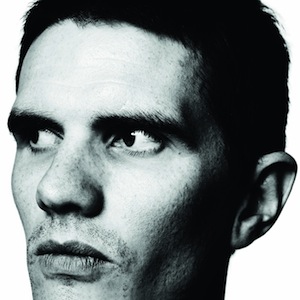If something about Lescop sounds familiar then that’s because it is. Hailed as a nouvelle icône de la cold wave, 34-year-old Mathieu Peudupin’s music draws on the genre that arrived around the time of his birth. If I were a betting man I’d definitely put money on Lescop also being a fan of early Depeche Mode and The Cure, with some Joy Division on occasion too, and 80s synth duos for good measure,
Much as with Savages (on whose Pop Noire label this is released), the whole is greater than the sum of its parts. It’s something people seem to need reminding of again and again in 2013 – incredible new music isn’t negated or irrelevant because it wears its influences proudly. It’s like pointing at someone who has their mother’s nose and their father’s ears and noting there’s nothing original about them.
Lescop’s eponymous debut is teeming with life, undulating grooves, deft electronic ambience and has hefty hooks aplenty. No fat goon in a Teardrop Explodes t-shirt is going to spoil that by telling me he’s heard it all before. It marches with the confidence of a man about town, a noirish beast prowling the Parisian underground scene; it’s slick, seductive and stalks from club to club, and from capital city to capital city, while the rest of us sleep or do quotidian chores like working. Lescop paints a picture of himself as some elegantly wasted nightfly, although if that sounds shallow, there’s plenty of existential angst and dark emotion to sink your teeth into.
Bold opener and 2012 favourite ‘La Forêt’ explores the moments before the protagonist is shot, and makes one think of Camus’ L’Etranger with the boot on the other foot (or the gun in the other hand). On the new wavey ‘La Nuit Américaine’ he introduces us to Sandra, who thinks of herself as "une héroïne Hollywoodienne", a ghost with sunken cheeks who has, according to Lescop, had her back teeth ripped out (the French is more poetic: “Fantôme au dents du fond arrachées / Ses joues vers l’interieur sont creusées.”) ‘Le Mal Mon Ange’, featuring a sultry duet with Dorothée De Koon, gleams and preens at its own exquisite beauty; any comparisons with Gainsbourg by British journalists have been as predictable as they are lazy, though this does hint towards the delectable ‘Jane B’.
‘Tokyo La Nuit’, written with AV (another excellent chanteur electro-pop on the Parisian scene) recounts a night in Tokyo alone bored and drinking, and includes a bright green parrot on a Geisha’s shoulder (“Un perroquet vert rococo… Sur l’épaule d’une geisha”). Solitude has rarely sounded this sexy.
Lescop’s brooding vocal style is best exemplified on ‘Un Rêve’, a bass heavy stomper that missed its opportunity to own a John Hughes soundtrack some three decades earlier. As is the case with Savages, Lescop has taken the cool music of his childhood and spun it into something wildly evocative and deliciously poetic. It may draw on the past, but it is also something new in its execution; full of vitality, candour and mystery.


